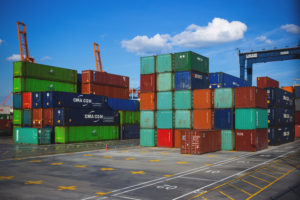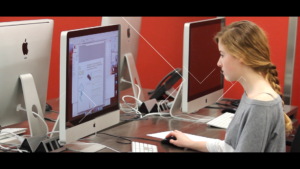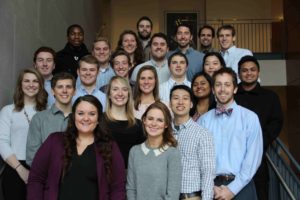The Association of Public and Land-grant Universities (APLU) announced Iowa State University as the “Talent” award winner during its sixth annual Innovation & Economic Prosperity (IEP) University Awards held on November 12, 2017 at the association’s annual meeting in Washington, DC. The Office of Economic Development and Industry Relations wanted to take this opportunity to highlight the three case study narratives Iowa State University submitted toward its award-winning application. The first in the series of three is a spotlight on the CyBIZ Lab case study narrative.
Case Study #1 – CyBIZ Lab: Creating a Website to Improve Intermodal Freight Transportation in Iowa

The searchable website, Container Locator, allows Iowa-based shippers to identify empty shipping containers coming in or out of the state on near real-time basis.
The Des Moines Area Metropolitan Planning Organization (MPO) hoped to develop a searchable website allowing Iowa-based shippers to identify empty containers coming in or out of the state on near real-time basis. Once located, shippers could contract the containers for their own use, saving time and money for both the shipping companies and Iowa firms that are looking to export goods, and benefiting the end consumer by lowering the costs of delivering goods. Efficiencies gained would also have subsequent safety and environmental impacts with less traffic on the roads and less fuel burned.
The MPO contracted CyBIZ Lab to conduct extensive market research to determine the feasibility of the website and ultimately, develop a web tool called Container Locator.
CyBIZ Lab, started in 2013, is an Iowa State University College of Business initiative that enables students to gain valuable training and real-world experience that makes them more qualified, competitive and marketable to employers. CyBIZ consists of cross-functional teams of undergraduate and graduate students who work on a variety of fee-based business and organizational projects. Students work to solve real business problems, and companies and organizations receive potential solutions from a perspective outside the company. Since its inception, CyBIZ has conducted over 120 projects with an average of 35 students participating in the program each year.
CyBIZ also provides support for Iowa State faculty’s commercialization efforts. Their partnership with Iowa State’s Office of Economic Development and Industry Relations and ISU Research Foundation provides opportunities for students to work with faculty validating business opportunities based on technological discoveries, while providing a unique learning opportunity for the students to be involved at the ground-level of new startup companies.
Other strategic partnerships with ISU’s Center for Industrial Research and Service (CIRAS), College of Engineering, Model Farm, MBA program and others add capacity and expertise to the CyBIZ team, and allows partners to tap into the CyBIZ students’ business skills and insights.
“Having these strategic partnerships across campus makes all of our work more efficient and garners a more comprehensive result for our clients,” noted Judi Eyles, Director of the CyBIZ Lab.
CyBIZ projects primarily focus on market research, competitive analysis, and data analysis. The variety of projects CyBIZ undertakes gives students experience in a multitude of industry sectors, including non-profit organizations such as the MPO.
The CyBIZ project with MPO was especially unique, as creating a shareable freight container database had never been attempted on a statewide scale before, nor had the CyBIZ students ever delved into website development.
Due to its scope, CyBIZ split the project into two phases with deliverables at each phase. The first phase was comprised of two steps: (1) identify what specific data was needed and how to format that data to be usable, and (2) conduct a feasibility evaluation to determine if the research conducted in the first phase could be implemented effectively.
Within Phase I, the CyBIZ students participated in open forums with external freight transportation stakeholders including the MPO’s Freight Roundtable, International Traders of Iowa, the Greater Des Moines Partnership and Bridgestone Firestone Ag Plant. The CyBIZ team held client discovery meetings with the industry leaders and received valuable end-user feedback.
Phase 2 of the project was website development and implementation, an involved, technical process spearheaded by a graduate student in Iowa State’s MS in Information Systems program. While conducting market research on data collection, the student developed a relationship with Datamyne, a data mining company, to collaborate on the task of collecting usable data and feeding it into the more easily accessible Container Locator website they were developing. Due to the complexity and impact of the project, the student was able to use the case for his master’s thesis.
Before the searchable website, collecting freight data was an expensive and lengthy process. Shippers could receive raw data from U.S. Customs but the large volume of data would still need to be cleaned and sorted. The Container Locator website reduces the massive amount of available data to only the most useful information, such as the carrier name, equipment dimensions, delivery destination city, date of delivery, drayman, contact information and the rail intermodal facility for return. The result is a far more efficient, user-friendly web tool, which is currently available free to the end-user.

Students from Iowa State’s Model Farm contributed to the project, helping to research website design and graphics.
During Phase 2, CyBIZ brought an additional team of Iowa State students to help with research on website design and graphics. The team consisted of four students from Model Farm, an Iowa State student-run, professionally managed creative services agency. The Model Farm students developed the brand standard guide, which influenced the colors, font choices, copy tone, and photo look and feel that were incorporated into the website. They also developed a logo with design consideration focused on MPO’s intent to scale in the future by expanding the website framework regionally or nationally and possibly charging subscription fees.
Besides the MPO project, CyBIZ and Model Farm students have worked together on a number of projects.
“The partnership creates an enriched environment, with students working with other students while guided by professionals, on projects that allow them to have robust experiences beyond the typical classroom setting,” Director of Model Farm Tony Thrush said. “The students gain much earlier in-depth access to real-world situations within their educational experience.”
The collaborative work experience provides an important tool or capability the students bring to the workforce – the ability to work with others toward a common objective, attaining success through leveraging each other’s skills and knowledge. Not surprisingly, many companies actively recruit the students that participated in their projects.
MPO Senior Planner Andrew Collings credits CyBIZ with completing the two-year project at a significant cost savings.
“CyBIZ Lab completed the work in a very efficient manner and has allowed us to move forward with the project without having to seek out more variable types of funding,” Collings said. “This has a huge impact on our ability to prove the concept of this project.”
###
Side note: On April 11, 2018, the Des Moines Area MPO won the “Best User of Technology Award” for its Container Locator project during the Technology Association of Iowa’s 2018 Prometheus Awards, a statewide event held to recognize and celebrate Iowa’s innovative companies and individuals impacting Iowa’s $11 billion technology industry.
Read Case Study #2 – Fostering Connections: Accessing Tomorrow’s Talented Workforce here.
Read Case Study #3 – Inclusivity Case Study: 4-H Youth Development Creating a Sense of Place here.


Recent Comments